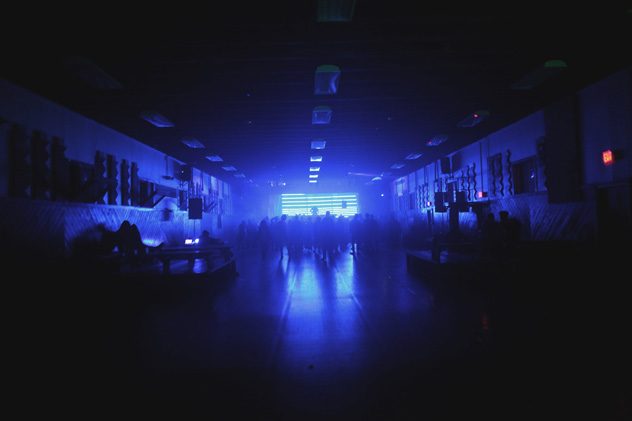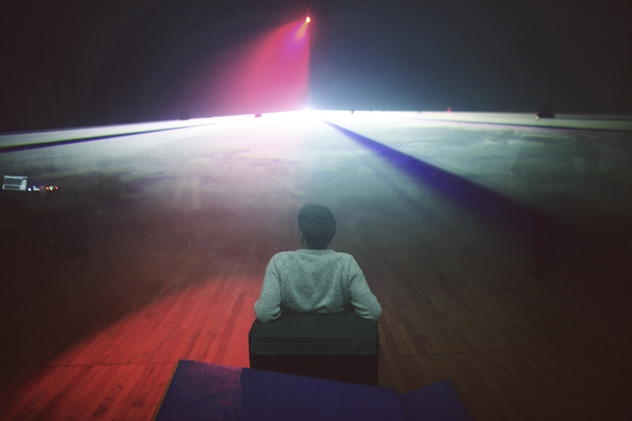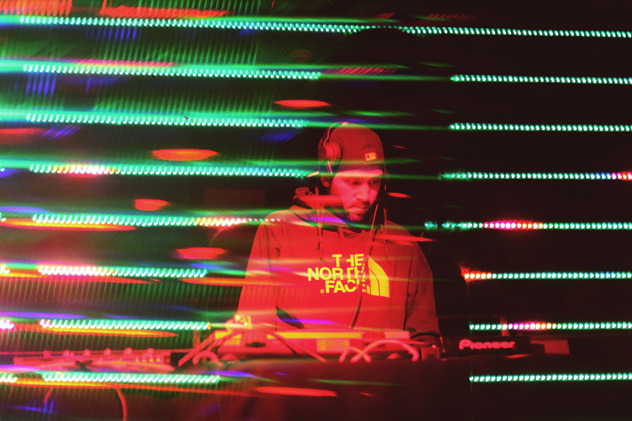- Two hours north of New York City, in a village of about 1,200 people, lies Camp Lakota. Driving up the foothill roads of the Catskill Mountains and past the camp's rustic entranceway, some things may look eerily familiar. There are the cabins with the squeaky metal bunks; there's the graffiti on the bathroom door that reads “butt” punctuated by an upside-down cross; there's the mess hall displaying flags from previous campers' sports victories. The difference this time is there are no camp counselors, no jocks vying to kick your ass, and instead of archery or arts and crafts, the only activity on the schedule is a cumulative 27 hours of avant-garde techno.
The inaugural Sustain-Release weekend, organized by Brooklyn promoters Aurora Halal and Zara Wladawsky, brought roughly 500 people into the Appalachian Plateau last weekend for two days of machine music provided by Rrose, Xosar, Joey Anderson and Jus-Ed among others. Though the festival had headliners, its organizers opted to showcase the strengths of Brooklyn's DIY scene rather than focus on big name DJs, with a stage curated by local venue Bossa Nova Civic Club and a six-hour block of late-night programming organized by Bunker New York. Even the venues' lighting installations, designed by Nitemind, were brought from a studio down the street from Bossa Nova, and the food and drink was provided by restaurants from within the borough. The emphasis on community made Sustain-Release less about the particularities of each performance, and more about the holistic experience of the weekend at large.
 The event housed two stages: a warehouse-sized venue built into the camp's central hall, and a smaller Bossa Nova stage inside of a tunnel-shaped gymnasium at the edge of the camp site. Attendees drifted between the two along a dirt path lit by a string of lights that travelled through the camp's basketball court, where partiers congregated to play ball (poorly) and hide out from the punishing bass that seemed to be everywhere. The path continued onto two sets of cabins and a field where people set up tents for camping; sprinkled throughout that was the swimming pool (where Saturday's daytime party was supposed to take place before being canceled by rain), a yoga room, some volleyball courts and beyond that, another trail, which led to the beautiful Mastens Lake.
The vision for the weekend was concise and consistent. Leading up to the event, its organizers avoided any reference to PLUR (even eschewing the word “festival” in their own copy). They allowed info to spread through Facebook and by word of mouth rather than through advertising. And most importantly, they stuck to their own very particular sound—with performers and DJing converging on similar shades of abstract, aggressive techno. There were chunks of time throughout the weekend when one could go back and forth between the venues looking for a change of pace and still hear the same ultra-minimalist arrangement of kick drums, hi-hats and weighty gusts of reverb. The crowd, thirsty for a touch of disco or a hint of funk, went crazy for acts like Analog Soul, twin sisters who courted the groovier, more swingin' side of house and techno. The sisters drew a minute-long round of applause from the Bossa stage after closing their set with a string of soulful house tracks that fell somewhere between gospel-inflected New York garage and jackin' Chicago house.
The event housed two stages: a warehouse-sized venue built into the camp's central hall, and a smaller Bossa Nova stage inside of a tunnel-shaped gymnasium at the edge of the camp site. Attendees drifted between the two along a dirt path lit by a string of lights that travelled through the camp's basketball court, where partiers congregated to play ball (poorly) and hide out from the punishing bass that seemed to be everywhere. The path continued onto two sets of cabins and a field where people set up tents for camping; sprinkled throughout that was the swimming pool (where Saturday's daytime party was supposed to take place before being canceled by rain), a yoga room, some volleyball courts and beyond that, another trail, which led to the beautiful Mastens Lake.
The vision for the weekend was concise and consistent. Leading up to the event, its organizers avoided any reference to PLUR (even eschewing the word “festival” in their own copy). They allowed info to spread through Facebook and by word of mouth rather than through advertising. And most importantly, they stuck to their own very particular sound—with performers and DJing converging on similar shades of abstract, aggressive techno. There were chunks of time throughout the weekend when one could go back and forth between the venues looking for a change of pace and still hear the same ultra-minimalist arrangement of kick drums, hi-hats and weighty gusts of reverb. The crowd, thirsty for a touch of disco or a hint of funk, went crazy for acts like Analog Soul, twin sisters who courted the groovier, more swingin' side of house and techno. The sisters drew a minute-long round of applause from the Bossa stage after closing their set with a string of soulful house tracks that fell somewhere between gospel-inflected New York garage and jackin' Chicago house.
 The strongest performance of the Bossa Nova stage—if not the whole festival—came from relative newcomers DUST. Equipped with an array of sequencers, synths and drum machines, the trio delivered warped Italo disco, acid house and retro-futuristic techno with just the right amount of grit and sharp songwriting. Frequent collaborator Greem Jellyfish fronted the performance, growling and screaming through a series of pedals while Mike Sherburn and John Barclay smashed synth drums, starting a literal mosh pit at 3:30 AM that eventually transformed back into a cuddle puddle.
Joey Anderson was the highlight of the main stage, with soaring, melodic techno that was so full of feelings it bordered on camp. At one point he played nearly all nine minutes of Henrik Schwarz's remix of "Vuoi Vuoi Me" by Mari Boine, a deep house cut from 2006 that builds on a traditional melody sung by Norway's Lappish indigenous people. Rrose, the event's unofficial headliner, came strapped with hallucinogenic techno that shifted the mood of the main stage from bangin' warehouse party to transcendent spiritual encounter. The soundsystems, provided by Tsunami Bass Experience, were both clear and powerful, though at times they were actually too bass-heavy—not the worst problem to have.
The strongest performance of the Bossa Nova stage—if not the whole festival—came from relative newcomers DUST. Equipped with an array of sequencers, synths and drum machines, the trio delivered warped Italo disco, acid house and retro-futuristic techno with just the right amount of grit and sharp songwriting. Frequent collaborator Greem Jellyfish fronted the performance, growling and screaming through a series of pedals while Mike Sherburn and John Barclay smashed synth drums, starting a literal mosh pit at 3:30 AM that eventually transformed back into a cuddle puddle.
Joey Anderson was the highlight of the main stage, with soaring, melodic techno that was so full of feelings it bordered on camp. At one point he played nearly all nine minutes of Henrik Schwarz's remix of "Vuoi Vuoi Me" by Mari Boine, a deep house cut from 2006 that builds on a traditional melody sung by Norway's Lappish indigenous people. Rrose, the event's unofficial headliner, came strapped with hallucinogenic techno that shifted the mood of the main stage from bangin' warehouse party to transcendent spiritual encounter. The soundsystems, provided by Tsunami Bass Experience, were both clear and powerful, though at times they were actually too bass-heavy—not the worst problem to have.
 Given the number of organizational snags that could have plagued the festival—and considering that it's an entirely grassroots, crowd-funded event—it's not hard to see Sustain-Release as a raging success. The event attracted an eclectic crowd of overlapping fans and friends (glitzy fashion majors, chin-stroking nerds, new age techno hippies), and hosted one of the most diverse lineups of any electronic music festival in recent memory, with women occupying nearly a third of the bill. Its organizers were literally out there themselves in the rain hauling trash cans, clearing out ash trays, making sure all the partiers were healthy and safe—and its attendees could clearly handle whatever they chose to put in their bodies. It all ended in a morning bonfire on the lake that felt a lot like the last day of summer camp: we had finally forged our friendships, and we were all reluctantly savoring the last few minutes before mom or dad picked us up.
Photo credit: Erez Avissar
Given the number of organizational snags that could have plagued the festival—and considering that it's an entirely grassroots, crowd-funded event—it's not hard to see Sustain-Release as a raging success. The event attracted an eclectic crowd of overlapping fans and friends (glitzy fashion majors, chin-stroking nerds, new age techno hippies), and hosted one of the most diverse lineups of any electronic music festival in recent memory, with women occupying nearly a third of the bill. Its organizers were literally out there themselves in the rain hauling trash cans, clearing out ash trays, making sure all the partiers were healthy and safe—and its attendees could clearly handle whatever they chose to put in their bodies. It all ended in a morning bonfire on the lake that felt a lot like the last day of summer camp: we had finally forged our friendships, and we were all reluctantly savoring the last few minutes before mom or dad picked us up.
Photo credit: Erez Avissar
 The event housed two stages: a warehouse-sized venue built into the camp's central hall, and a smaller Bossa Nova stage inside of a tunnel-shaped gymnasium at the edge of the camp site. Attendees drifted between the two along a dirt path lit by a string of lights that travelled through the camp's basketball court, where partiers congregated to play ball (poorly) and hide out from the punishing bass that seemed to be everywhere. The path continued onto two sets of cabins and a field where people set up tents for camping; sprinkled throughout that was the swimming pool (where Saturday's daytime party was supposed to take place before being canceled by rain), a yoga room, some volleyball courts and beyond that, another trail, which led to the beautiful Mastens Lake.
The vision for the weekend was concise and consistent. Leading up to the event, its organizers avoided any reference to PLUR (even eschewing the word “festival” in their own copy). They allowed info to spread through Facebook and by word of mouth rather than through advertising. And most importantly, they stuck to their own very particular sound—with performers and DJing converging on similar shades of abstract, aggressive techno. There were chunks of time throughout the weekend when one could go back and forth between the venues looking for a change of pace and still hear the same ultra-minimalist arrangement of kick drums, hi-hats and weighty gusts of reverb. The crowd, thirsty for a touch of disco or a hint of funk, went crazy for acts like Analog Soul, twin sisters who courted the groovier, more swingin' side of house and techno. The sisters drew a minute-long round of applause from the Bossa stage after closing their set with a string of soulful house tracks that fell somewhere between gospel-inflected New York garage and jackin' Chicago house.
The event housed two stages: a warehouse-sized venue built into the camp's central hall, and a smaller Bossa Nova stage inside of a tunnel-shaped gymnasium at the edge of the camp site. Attendees drifted between the two along a dirt path lit by a string of lights that travelled through the camp's basketball court, where partiers congregated to play ball (poorly) and hide out from the punishing bass that seemed to be everywhere. The path continued onto two sets of cabins and a field where people set up tents for camping; sprinkled throughout that was the swimming pool (where Saturday's daytime party was supposed to take place before being canceled by rain), a yoga room, some volleyball courts and beyond that, another trail, which led to the beautiful Mastens Lake.
The vision for the weekend was concise and consistent. Leading up to the event, its organizers avoided any reference to PLUR (even eschewing the word “festival” in their own copy). They allowed info to spread through Facebook and by word of mouth rather than through advertising. And most importantly, they stuck to their own very particular sound—with performers and DJing converging on similar shades of abstract, aggressive techno. There were chunks of time throughout the weekend when one could go back and forth between the venues looking for a change of pace and still hear the same ultra-minimalist arrangement of kick drums, hi-hats and weighty gusts of reverb. The crowd, thirsty for a touch of disco or a hint of funk, went crazy for acts like Analog Soul, twin sisters who courted the groovier, more swingin' side of house and techno. The sisters drew a minute-long round of applause from the Bossa stage after closing their set with a string of soulful house tracks that fell somewhere between gospel-inflected New York garage and jackin' Chicago house.
 The strongest performance of the Bossa Nova stage—if not the whole festival—came from relative newcomers DUST. Equipped with an array of sequencers, synths and drum machines, the trio delivered warped Italo disco, acid house and retro-futuristic techno with just the right amount of grit and sharp songwriting. Frequent collaborator Greem Jellyfish fronted the performance, growling and screaming through a series of pedals while Mike Sherburn and John Barclay smashed synth drums, starting a literal mosh pit at 3:30 AM that eventually transformed back into a cuddle puddle.
Joey Anderson was the highlight of the main stage, with soaring, melodic techno that was so full of feelings it bordered on camp. At one point he played nearly all nine minutes of Henrik Schwarz's remix of "Vuoi Vuoi Me" by Mari Boine, a deep house cut from 2006 that builds on a traditional melody sung by Norway's Lappish indigenous people. Rrose, the event's unofficial headliner, came strapped with hallucinogenic techno that shifted the mood of the main stage from bangin' warehouse party to transcendent spiritual encounter. The soundsystems, provided by Tsunami Bass Experience, were both clear and powerful, though at times they were actually too bass-heavy—not the worst problem to have.
The strongest performance of the Bossa Nova stage—if not the whole festival—came from relative newcomers DUST. Equipped with an array of sequencers, synths and drum machines, the trio delivered warped Italo disco, acid house and retro-futuristic techno with just the right amount of grit and sharp songwriting. Frequent collaborator Greem Jellyfish fronted the performance, growling and screaming through a series of pedals while Mike Sherburn and John Barclay smashed synth drums, starting a literal mosh pit at 3:30 AM that eventually transformed back into a cuddle puddle.
Joey Anderson was the highlight of the main stage, with soaring, melodic techno that was so full of feelings it bordered on camp. At one point he played nearly all nine minutes of Henrik Schwarz's remix of "Vuoi Vuoi Me" by Mari Boine, a deep house cut from 2006 that builds on a traditional melody sung by Norway's Lappish indigenous people. Rrose, the event's unofficial headliner, came strapped with hallucinogenic techno that shifted the mood of the main stage from bangin' warehouse party to transcendent spiritual encounter. The soundsystems, provided by Tsunami Bass Experience, were both clear and powerful, though at times they were actually too bass-heavy—not the worst problem to have.
 Given the number of organizational snags that could have plagued the festival—and considering that it's an entirely grassroots, crowd-funded event—it's not hard to see Sustain-Release as a raging success. The event attracted an eclectic crowd of overlapping fans and friends (glitzy fashion majors, chin-stroking nerds, new age techno hippies), and hosted one of the most diverse lineups of any electronic music festival in recent memory, with women occupying nearly a third of the bill. Its organizers were literally out there themselves in the rain hauling trash cans, clearing out ash trays, making sure all the partiers were healthy and safe—and its attendees could clearly handle whatever they chose to put in their bodies. It all ended in a morning bonfire on the lake that felt a lot like the last day of summer camp: we had finally forged our friendships, and we were all reluctantly savoring the last few minutes before mom or dad picked us up.
Photo credit: Erez Avissar
Given the number of organizational snags that could have plagued the festival—and considering that it's an entirely grassroots, crowd-funded event—it's not hard to see Sustain-Release as a raging success. The event attracted an eclectic crowd of overlapping fans and friends (glitzy fashion majors, chin-stroking nerds, new age techno hippies), and hosted one of the most diverse lineups of any electronic music festival in recent memory, with women occupying nearly a third of the bill. Its organizers were literally out there themselves in the rain hauling trash cans, clearing out ash trays, making sure all the partiers were healthy and safe—and its attendees could clearly handle whatever they chose to put in their bodies. It all ended in a morning bonfire on the lake that felt a lot like the last day of summer camp: we had finally forged our friendships, and we were all reluctantly savoring the last few minutes before mom or dad picked us up.
Photo credit: Erez Avissar